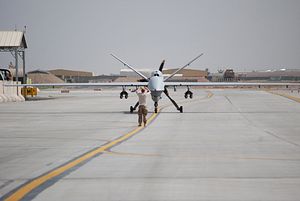On May 21, 2016, for the first time ever, a supreme leader of the Afghan Taliban was killed by a direct airstrike by U.S. forces. This was hailed as a remarkable achievement for the American and Afghan governments.
The Taliban leader, Mullah Akhtar Mansour, was killed along with his driver in the Balochistan province of Pakistan while he was driving back from a visit to Iran. This marked a significant change in the modus operandi of the United States, because in recent years U.S. drones had restricted their airstrikes to targeting al-Qaeda and the Islamic State (ISIS) only in Afghanistan.
The conventional wisdom on the matter is that the Americans had been collecting intelligence about Mansour for three months. When they got a chance, they struck their target, eliminating the Taliban leader.
However, there are many questions that remain unanswered about the death of Mullah Akhtar Mansour. Among the largest: who benefits most from the death of the Taliban leader?
Most Afghans would hail the death of the Taliban leader as an achievement. However most Afghans also know very well that killing the Taliban leader is not likely to bring any progress in the war or the peace negotiations with the Taliban. Once the Taliban leader is dead, the militant group would likely announce an even more hardline successor. That is precisely what happened after the death of Mullah Muhammad Omar. Upon his death, Mansour was appointed, having garnered a reputation for being even more of a hardliner than Mullah Omar.
It was during Mansour’s leadership that the Taliban captured Kunduz province and committed the deadly suicide attack on the 10th department of the National Directorate of Security in Kabul. Most Afghans understand that once a new leader takes control of the Taliban, in order to prove his capabilities, he is likely to unleash even more violence on the Afghan nation. Therefore, Afghanistan only marginally benefits from the death of the Taliban leader.
For the United States, the killing of the Afghan Taliban leader is a PR victory along with payback for the lives of American soldiers killed in Afghanistan in the last decade. It also shows that the U.S. military machine is still potent and active in targeting terrorists wherever they hide.
However, surprisingly, the country that benefits the most from the death of Mansour is Pakistan. Pakistan is widely believed to be supporting the Afghan Taliban movement by providing them with weapons, money, training, and sanctuaries. Therefore, on paper, it would appear that Pakistan would be at a loss from the death of the Taliban leader. But look closer, and you would see that there are many incentives for Pakistan to want to get rid of Mullah Akhtar Mansour.
In the recent months, there have been reports of a fall out between Pakistan’s Inter-Services Intelligence (ISI) and Mansour. The fact that the Taliban leader was killed while traveling back from Iran to Pakistan raises many questions. Why was Mansour in Iran?
It is possible that Mansour had been trying to establish a closer relationship with Iran due to a worsening relationship with the Pakistani intelligence establishment. Inside Afghanistan, there have been reports that Mansour moved his family to Iran in order to reduce his dependence on Pakistan.This alone could be reason enough for Pakistan to want to eliminate him.
Another reason why Pakistan would benefit from the death of Mansour was because of his failure to reunite the Taliban, which split into two factions following the death of founding leader Mullah Muhammad Omar. The splinter Taliban group led by Mullah Rasool has moved to southwestern Afghanistan and vehemently opposed Mansour’s leadership of the Taliban.
However, after Mansour’s death, Mullah Haibatullah Akhundzada was appointed as his successor. Akhundzada is well positioned to reunite the splinter Taliban group because he hails from the same Noorzai tribe as the splinter group leader Rasool. Mansour, on the other hand, was from the Ishaqzai tribe, which made it harder for him to appeal to Rasool’s splinter Taliban group.
Additionally, the fact that new leader Akhundzada is famous for being a religious leader rather than a military or political leader makes him well positioned to unite the Taliban on a religious basis. Akhundzada’s lack of political or military skills also benefits Pakistan, as this means that his deputy Sirajuddin Haqqani will likely be running the political and military affairs of the Taliban.
Sirajuddin Haqqani is also the leader of the notorious Haqqani Network, which is believed to be the closest of all Afghan insurgent groups to Pakistan’s ISI. As a result, Pakistani intelligence will now have more control over the day-to-day operations of the Taliban.
Finally another benefit that Pakistan takes from Mansour’s death is the disruption of the Quadrilateral Coordination Group (QCG). The QCG was a four-nation initiative for peace that included Afghanistan, Pakistan, China, and the United States. However, Pakistan’s failure to bring the Taliban to the negotiating table led to pressure from the United States and Afghanistan. Pakistan was running out of excuses.
The pressure from the United States became more intense when Congress decided to block U.S. funding for a sale of F-16s to Pakistan this year. However, now with Mansour dead, Pakistan can use this opportunity as an excuse for not bringing the Taliban to the negotiating table. Pakistan can claim that the Taliban is going through a leadership transition as a result of which they do not want to enter peace talks.
In the meantime, by providing information on Mansour’s whereabouts to the Americans for the airstrike (as some sources have suggested, though Pakistan has formally denounced the strike), Pakistan would have won some much-needed goodwill with the Americans. This could lead to a resumption of the military aid to Pakistan.
Sayer Daudzai is the Vice Consul of Afghanistan in Istanbul, Turkey.
































